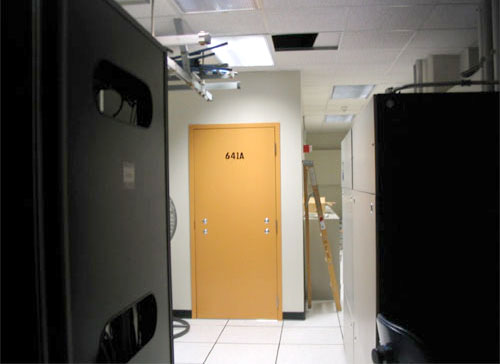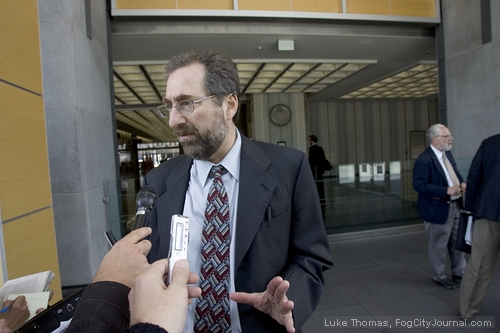
A secret room in the offices of AT&T in San Francisco
where internet and phone data is allegedly being surveiled by the NSA
without warrants or subpoenas.
June 5, 2009
A federal district court judge dealt a blow to dozens of plaintiffs Wednesday in a warrantless wiretapping case while providing a lifeline to other similar cases.
At issue in the case in which plaintiffs suffered a setback – Hepting v. AT&T – is the power of Congress to create legislation that amends a law in such a way as to determine the outcome of a pending lawsuit by providing immunity for the defendants. In this case, the defendants are large telecommunication companies, accused in Hepting of aiding and abetting clandestine warrantless surveillance programs undertaken by the National Security Agency (NSA).
On Wednesday, Walker dismissed the suit arguing Congress has the power to grant the telecoms retroactive immunity against prosecution for their role in the warrantless surveillance.
“We’re disappointed,” said Electronic Frontier Foundation (EFF) Legal Director Cindy Cohn. “We plan to appeal.”

EFF Legal Director Cindy Cohn
In July 2008, Congress amended the Foreign Intelligence Surveillance Amendments Act (FISA), in part to stop the Hepting case in its tracks. Hepting plaintiffs had already filed suit against AT&T and other telecoms in January 2006 after the telecoms had allegedly released private phone and Internet records to the NSA without warrants. Plaintiffs sued, claiming AT&T had violated the Electronic Communications Privacy Act, the Stored Communications Act, and Fourth Amendment protections against unreasonable searches and seizures.
“We’re disappointed that Congress enacted the FISA Amendments last year to give the telecoms immunity. We wanted the claims decided in court,” added Vince Parrett of Motley Rice, a South Carolina law firm representing Verizon subscribers. “We think Congress and the executive branch let down the American people.”
Silver Linings
Left in tact in Judge Walker’s ruling is the ability of plaintiffs in similar cases, such as Jewel v. the NSA and Al-Haramain v. Bush, to continue their suits against the government for wiretapping Americans without warrants.
“The court agrees with the United States and the telecommunication company defendants on this point,” Walker wrote. “Plaintiffs retain a means of redressing the harms alleged in their complaints by proceeding against governmental actors and entities who are, after all, the primary actors of the alleged wiretapping activities.”
Plaintiffs in Jewel v. the NSA, many of whom are the same plaintiffs from the Hepting case, filed suit in September 2008.
“Our Jewel case is continuing,” said Rebecca Jeschke, spokesperson for EFF. “The reason that we filed Jewel v. the NSA was because Hepting had gotten mired in this immunity debate.”
The government has filed a motion to dismiss the Jewel case. The hearing will be on July 15.
Al-Haramain v. Bush
In the case of Al-Haramain v. Bush, two lawyers for an Oregon branch of the Islamic foundation, Al-Haramain, sued the Bush administration in February 2006 on the basis that the NSA had spied on the foundation without warrants in March and April 2004, in violation of the 1978 Foreign Intelligence Surveillance Act. The lawyers and a third individual associated with the foundation (now defunct) learned that the government had been eavesdropping on their communications when the US Treasury Department, which was investigating its possible financial support of terrorist organizations, accidentally delivered a top-secret document to them in August 2004 that revealed the foundation was being surveiled without a warrant.
The case has been in and out of Judge Walker’s courtroom, the 9th US Circuit Court of Appeals, and other federal courts for several years. On May 22, Judge Walker grew frustrated and ordered Department of Justice lawyers – Anthony Coppolino of the US Department of Justice, and Tim Stinson of the Office of General Counsel for the NSA – to tell him why he should not declare the plaintiffs in the case winners by default, since the government appeared to be engaging in activities to thwart the progress of the case at a every turn.
“This is a lawsuit, not a career,” Judge Walker reminded lawyers Wednesday.
On Wednesday, Walker agreed to let the case move forward – but without relying on the ‘top-secret’ document which had been accidentally delivered to the plaintiffs. Copies of the documents were subsequently destroyed out of fear of prosecution and have since been deemed unnecessary for litigation. That phase of the case will begin on September 1.
“Judge Walker has charted a path for litigation on whether we have standing to sue and on the question of whether the president has the power to break the law,” said plaintiffs’ attorney Jon Eisenberg. “It could mean putting a stop to the imperial presidency that cropped under Bush, and that I fear is cropping up under [President] Obama.”

Plaintiffs’ attorney Jon Eisenberg
McMurray v. Verizon, AT&T, and BellSouth
On Wednesday, Judge Walker also considered a motion to dismiss a related warrantless wiretapping case, McMurray v. Verizon, et al. Plaintiffs in McMurray are suing Verizon, AT&T, and BellSouth (now merged with AT&T) for the same matter – the relinquishment of subscriber records to the NSA. However, the McMurray plaintiffs broke off from the large multi-district litigation of Hepting to pursue a different tactic after the passage of the FISA Amendments Act. In this case, plaintiffs are claiming that the passage of the act – in particular Section 802 which creates the immunity for the telecommunication giants – constitutes a ‘taking’ of a chance for a favorable judgment in a lawsuit that was already in progress (Hepting), and is thus a violation of the Fifth Amendment right to due process.
Coppolino and Stinson and lawyers representing each of the telecommunications companies sought a motion to dismiss the case.
On Wednesday, Judge Walker continued that case to an unspecified date no later than June 19.
Luke Thomas contributed to this report.


 The Hunger Site
The Hunger Site
No Comments
Comments for Federal Judge Issues Mixed Rulings
in Warrantless Wiretapping Cases are now closed.